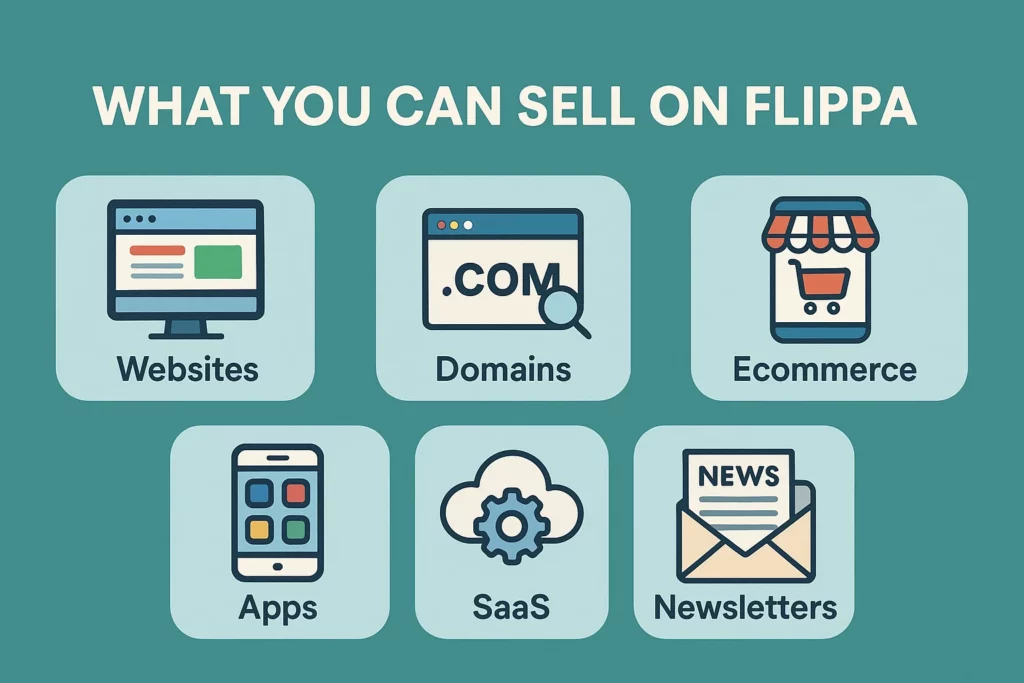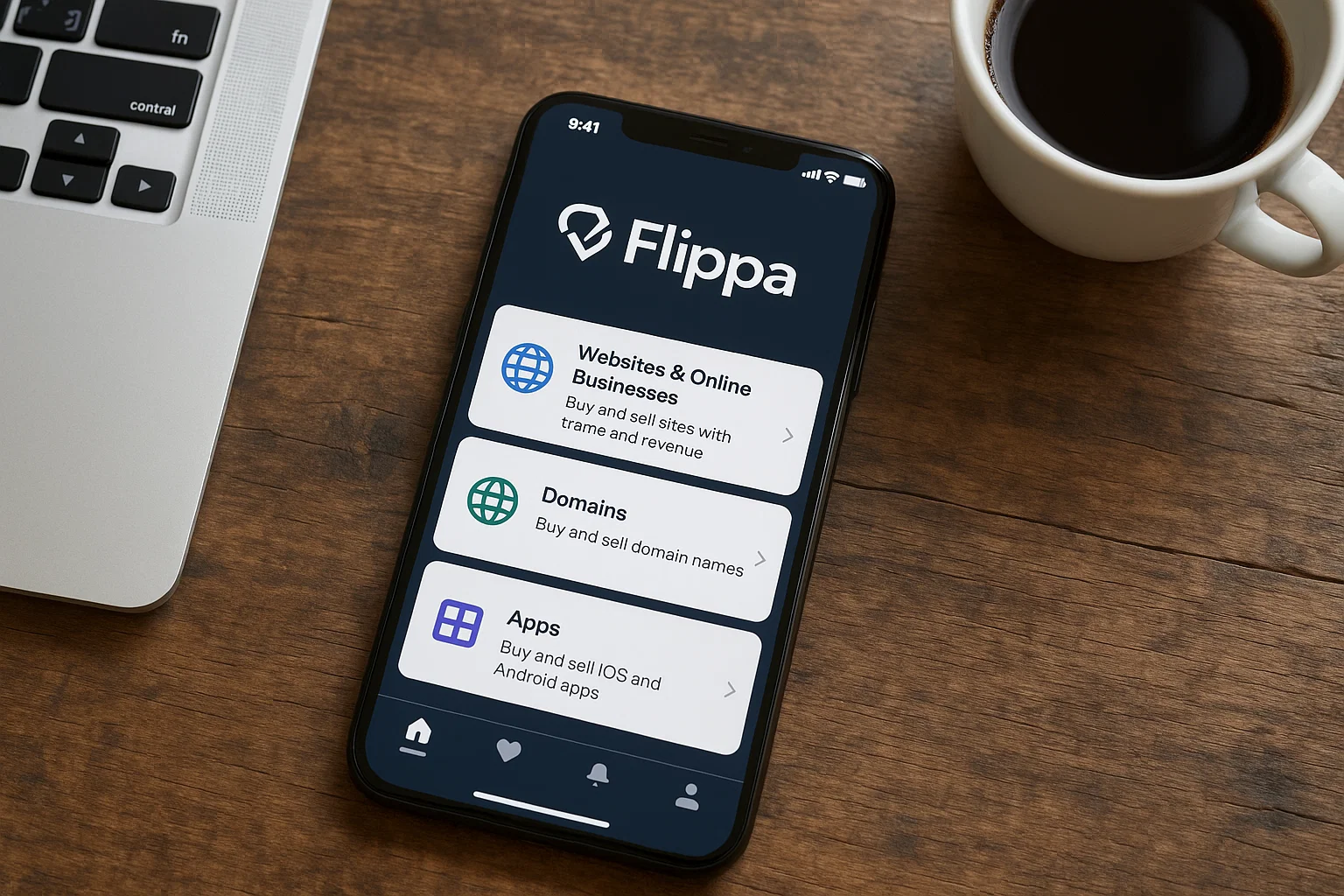If you’ve ever dreamed of flipping websites like real estate—or better yet, buying a ready-to-roll digital business instead of building from scratch—you’ve probably crossed paths with Flippa. For side hustlers, indie hackers, and digital entrepreneurs, Flippa is like the eBay of online businesses. It’s where domains, SaaS tools, mobile apps, and content sites change hands like hot potatoes… only way more profitably.
I still remember a friend in college who bought a meme site on Flippa for $300 and flipped it for $3,000 three months later after adding some Google Ads. While I was busy debugging Java code, he was collecting PayPal alerts. That’s when I realized—Flippa isn’t just a marketplace. It’s a playground for digital entrepreneurs who want ROI without reinventing the wheel.
And if you’re one of those creators or startup folks dreaming of launching a Flippa-like app for your niche—Miracuves has your back. We specialize in clone app development that’s fast, scalable, and oh-so-customizable. But first, let’s unpack how Flippa actually works.
What Exactly Is Flippa?
A Marketplace for Digital Assets
Flippa is an online marketplace where people buy and sell digital properties—think websites, eCommerce stores, blogs, SaaS tools, mobile apps, and even Amazon FBA businesses.
Think of It As…
- Zillow for websites
- Shopify for business flipping
- Tinder for buyers & sellers (but with fewer ghostings)
With over 3 million users globally, Flippa has democratized digital entrepreneurship by making business transactions accessible to anyone with Wi-Fi and a dream.
According to Flippa’s internal data, websites sell for anywhere between $500 to $5M+, depending on revenue, traffic, and growth potential.
Related Entities
- Competitors: Empire Flippers, FE International, Motion Invest
- Tools It Integrates With: Google Analytics, AdSense, Stripe, Shopify, SEMrush
- Platforms Available: iOS, Android, Web

Also Read :-What Drives the Cost of Building an Online Marketplace?
How Does Flippa Work?
1. Create or Claim a Listing
Sellers sign up, provide asset details, connect analytics tools, and set pricing options—fixed or auction. Listings include financials, traffic, growth projections, and screenshots.
2. Buyer Browsing & Bidding
Buyers use filters (price, niche, monetization model) to discover assets. They can “watch” listings, contact sellers, or place bids in real-time.
3. Escrow & Transfer
Once a deal’s struck, Flippa provides a secure escrow service to manage payments and digital asset transfers safely.

Flippa’s Business & Revenue Model
Flippa isn’t just flipping websites—it’s flipping the script on online marketplaces with a mix of revenue channels:
| Revenue Stream | Description |
|---|---|
| Listing Fees | Starts at $29; premium options available |
| Success Fees | 5–15% commission on successful transactions |
| Add-On Services | Legal docs, valuations, due diligence packages |
| Featured Listings | Pay-to-boost visibility |
Who Uses Flippa?
- Solopreneurs: Buy profitable blogs or micro-SaaS for passive income
- Agencies: Acquire lead-gen assets or apps for client services
- Startups: Buy validated MVPs instead of building from scratch
- Creators: Sell their side-projects or scale existing ones through acquisitions
Micro-Trend Alert
“Acqui-hiring” is growing—startups buy digital businesses not just for tech but for talent. Flippa makes it easier than ever.

Features That Make Flippa Tick
Smart Matching
Flippa suggests assets based on buyer behavior—think Netflix recommendations, but for hustlers.
Integrated Analytics
Plug in GA, Stripe, and AdSense to auto-populate performance metrics. Transparency builds trust.
Secure Escrow
Buyers and sellers are protected through Flippa’s integrated escrow system—no shady deals here.
Built-in Valuation Tool
Uses machine learning and sales history to give your business a baseline value. Saves time (and heartbreak).
Explore the best Flippa clone scripts of 2025 — compare features, pricing, and tech stack to launch your digital marketplace faster.
Why Build a Flippa Clone?
Let’s be honest. Every niche deserves a Flippa-like app. Whether it’s flipping Shopify themes, Notion templates, newsletters, or digital collectibles—a niche marketplace with Flippa’s DNA can be a goldmine.
With the right twist, a Flippa clone app can cater to:
- Outdoor gear rentals
- eLearning courses
- Creator monetization channels
- No-code marketplaces
At Miracuves, we craft tailor-made (oops, customizable!) clones that are feature-packed and future-ready. Whether you want auctions, escrow, valuations, or seller profiles—we plug in what matters, and trim the fluff.
Startups choose our Flippa clone for its ready-to-launch architecture, reducing development time and accelerating marketplace entry.
Conclusion
Flippa turned a once-nerdy idea—buying and selling digital assets—into a slick, scalable hustle model. From solo sellers to savvy VCs, it has something for everyone willing to look beyond traditional investments.
The rise of niche marketplaces and the growing appetite for digital ownership make this a now or never moment.
At Miracuves, we help innovators launch high-performance app clones that are fast, scalable, and monetization-ready. Ready to turn your idea into reality? Let’s build together.
FAQs
What types of businesses sell best on Flippa?
Content sites, SaaS apps, and Amazon FBA stores are the top performers—especially those with consistent traffic and revenue.
Is Flippa safe for beginners?
Yes! With built-in escrow, verification, and due diligence tools, Flippa is newbie-friendly (as long as you do basic research).
Can I sell a mobile app on Flippa?
Absolutely. Whether it’s an Android productivity app or a game, Flippa allows app listings with performance insights from Google Play or the App Store.
How much does Flippa charge?
Listing fees start at $29, and Flippa takes a success fee (5–15%) based on the asset value. Optional upgrades cost extra.
Can I negotiate on Flippa?
Totally. Buyers and sellers can message privately and make counter-offers or deals outside the auction price.
How do I build a Flippa clone for my niche?
That’s where Miracuves steps in. We build full-featured clone apps that include escrow, bidding, analytics, and more.








